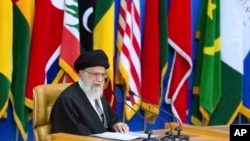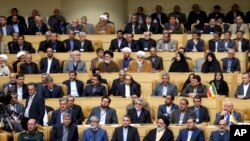Iran has held its first conference in six years supporting Palestinian uprisings, a forum that it says drew hundreds of delegates from 80 countries, reflecting the country’s resurgent clout on the world stage.
The two-day Sixth International Conference in Support of the Palestinian Intifada ended Wednesday in the Iranian capital, Tehran, with Iran’s president pledging more aid for Palestinians fighting against Israel. Tehran has long provided monetary and military assistance to Palestinian militants.
Iranian state media quoted President Hassan Rouhani as saying his people “have paid a high cost for supporting the Palestinians and opposing the Zionist regime of Israel’s actions, but they will continue their support with determination.”
State media said Rouhani made the comments while meeting Palestinian National Council chairman Salim al-Zanoun on the forum’s sidelines. Speaking to conference delegates, Rouhani also called Israel a “fake regime” that should be replaced by a Palestinian state for “Muslims, Christians and Jews.”
A day earlier, Iranian Supreme Leader Ayatollah Ali Khamenei opened the conference by calling Israel a “cancerous tumor” and urging the Palestinians to wage a “thunderous” intifada until what he called “the complete liberation of Palestine” — a reference to the historic British-controlled territory of Palestine that pre-dated Israel’s creation in 1948.
Palestinian intifadahs
Palestinians engaged in two violent revolts, or intifadas, against Israel’s occupation of the West Bank and the Gaza Strip, territories they claim for a state, from 1987 to 1993 and from 2000 to 2005. In recent years, Palestinian militants also have carried out waves of stabbing, vehicular and shooting attacks against Israelis, and have used Gaza as a base for 2014 war with Israel.
Iran honored those revolts by staging this week’s conference just more than one year after receiving relief from international sanctions as part of a nuclear deal with world powers, a deal that took effect in January 2016.
Tehran held its previous pro-Palestinian Intifada conferences in 2011, 2009, 2006, 2001 and 1991. There has been no official Israeli reaction to the latest forum.
Anti-Israel rhetoric
Emanuele Ottolenghi, an Iran analyst at the Washington-based research group Foundation for Defense of Democracies, sees the anti-Israel rhetoric of Khamenei and Rouhani as more of the same.
“They were vitriolic in their rhetoric against Israel before and after the nuclear deal (was signed in 2015) under the Obama administration, and now that Donald Trump is U.S. president,” Ottolenghi told the VOA Persian Service. “This regime remains wedded to the idea that Israel must be destroyed.”
But Ottolenghi said the ability of Iran to organize another conference in support of Palestinian militancy after a break of six years is noteworthy.
“We know the regime is paying full expenses for people from all over the world to come, using Iranian taxpayer money,” he said. “Iran is using money it obtained from the economic windfall of the nuclear deal to advance its incendiary rhetoric.”
The Central Bank of Iran has said the country posted economic growth of 7.4 percent in March to September 2016 compared with the same period in the previous year. Iran’s Financial Tribune newspaper said most of the growth came from increased oil exports allowed by the nuclear deal.
Delegates from countries, militant factions
Delegates to this week’s Tehran conference included members of Palestinian militant factions Hamas and Islamic Jihad and Lebanese militant group Hezbollah — all designated by the United States as terrorist organizations.
The forum also drew parliamentary delegations from about 20 countries, with at least seven sending their heads of parliament: Algeria, Lebanon, Mali, North Korea, Syria, Tanzania and Zimbabwe. The Iranian government also hosted Islamic scholars from Afghanistan and Pakistan and a group of ultra-orthodox anti-Zionist Jews.
In a VOA Persian interview, terrorism researcher Lee Smith of Washington’s Hudson Institute said Iran feels empowered not just by the nuclear deal but also by the spread of its proxy forces in the region.
“The Iranians boast about controlling four Arab governments, in Beirut, Damascus, Baghdad and Sana’a,” Smith said. “That is why they are testing the Trump administration (by holding the conference).” President Trump’s administration, which took office last month, has vowed to be more supportive of Israel than its predecessor.
Smith said Shi’ite-majority Iran also is using the Palestinian issue to try to gain a public relations advantage over its regional Sunni Arab rivals who traditionally have supported the predominantly Sunni Palestinians.
“Sunni powers like Egypt, Jordan and Saudi Arabia recently have become closer to Israel, some of them more openly than others, because of Iran,” Smith said. “So the Iranians are holding onto the Palestinian file, saying (to the Arab public) we represent or support the real resistance (against Israel).”
Arab League Secretary-General Ahmed Aboul-Gheit issued a statement last week re-iterating support for the creation of an independent Palestinian state alongside Israel, after Trump said he was open to other ideas besides a two-state solution to the long-running Israel-Palestinian conflict.
Hooman Bakhtiar of VOA’s Persian Service and Mehdi Jedinia of VOA’s Extremist Watch Desk contributed to this report.





